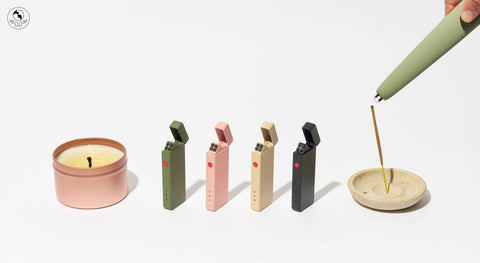
Throughout history, people have used various methods to light fires. From flintstones and tinderboxes to matches and gas lighters, humans have found ways to make fire-starting easier over time. But did you ever wonder when the first lighters were invented?
Let’s explore the fascinating history of lighter technology and discover when lighters were invented!
The First Lighters
Döbereiner’s lamp was a rather primitive device that combined hydrogen and oxygen gases within two chambers connected by a pipe with a lighted wick attached. When these gases were combined and ignited, the resulting flame could be used to light other combustible materials, such as candles. Although this device is considered the first lighter-like device, it was not widely used until 1816 when Johann Wolfgang Döbereiner created a smaller, more efficient version.
Modern Lighters
The invention of piezoelectricity in 1903 allowed for the production of lighters that used an electric spark instead of a flame to ignite flammable materials, such as gas and butane. This development made lighters much safer and easier to use. It wasn’t until the early 20th century that modern lighters appeared on the market. Today, many different types of lighters are available, ranging from traditional matches to disposable or rechargeable electric models.
The Uses And Benefits Of Electric Lighters
Safety Features
Electric lighters are designed with multiple safety features that make them safer than traditional lighters. For example, many models come with an LED indicator light that shows when the lighter is on or off, making it much easier to tell if you left the lighter turned on. Other safety features include automatic shutoff when the lighter is not in use for a certain time and rechargeable batteries or internal components, so you don’t have to refill them with fuel or purchase new ones.
Convenience
Electric lighters are also highly convenient to use. Many models have long necks, making it easier to light hard-to-reach places like deep crevices in your fireplace or the back corners of your candle holders.
Cost Savings
Finally, electric lighters offer significant cost savings over traditional lighters as they require no fuel and have fewer parts that need replacing over time. Additionally, many models come with rechargeable batteries or tesla coils which can last for many years —saving both time and money spent on fuel!
Lighting Candles:
Candles are usually lit using matches or lighters filled with butane gas. While these methods work just fine, they come with their drawbacks. Matches are relatively fragile and can be difficult to keep track of, while lighters filled with butane gas require frequent refilling and can be dangerous if not used properly. An electric lighter is a perfect solution for lighting candles as it is neither fragile nor dangerous. Plus, you never have to worry about running out of fuel because it can be recharged!
Grilling Food:
An electric lighter ensures that your grill will light quickly and safely every time. Grills are powered by propane gas or charcoal, which require a spark to ignite them and get them going. An electric lighter eliminates the need for matches or lighters filled with butane gas, which can be messy and hazardous when used near open flames.
Camping:
Campfires are essential for any camping trip; they provide warmth and comfort in cold weather and create a cozy atmosphere that allows friends and family to bond over conversation around the firelight. Because electric lighters produce an arc and not a flame, they will stay lit even in windy conditions. This makes them perfect for camping trips or outdoor activities like fishing or hunting. Just press the button, ignite the arc and get your campfire going!
Types Of Lighters
These are some of the different types of lighters available today:
Electric Coil Lighter
An electric coil lighter, like those produced by the USB Lighter Company, uses electricity to heat a metal coil, producing heat for lighting many types of materials. One of the benefits of an electric coil lighter is that it doesn't require any type of physical ignition mechanism, which means it can be used even if your hands are wet or cold. Electric coil lighters are also windproof, making them ideal for outdoor use.
Candle Lighters
A candle lighter is a type of long-handled lighter designed specifically for lighting candles. Candle lighters typically have a long, thin neck and a pointed tip to reach into tight spaces and light candles without singeing your fingers. Because they are designed for use with candles, candle lighters usually have no flame, so they won’t damage delicate surfaces like wax candles.
Permanent Match
A permanent match is a lighter that uses a small piece of metal (usually steel) to create a spark that ignites the fuel. Permanent matches are windproof and waterproof. However, one downside of permanent matches is that they can be difficult to light if you don't have enough fuel in the tank.
Butane Torch Lighter
A butane torch lighter is a refillable lighter that uses butane gas as its fuel source. Butane torch lighters produce a very hot flame (usually between 1,500 and 2,500 degrees Fahrenheit), which makes them suitable for specific tasks like soldering pipes or flambeing desserts like crème brûlée. However, because they produce such a hot flame, butane torch lighters are not recommended for use around children or pets.
Refillable Lighter
Refillable lighters use either butane gas or naphtha as their fuel source. They are known for their durability; however, they can be difficult to refill and leak over time if not stored properly.
Conclusion
The history of lighter technology is an interesting one, beginning with the invention of Döbereiner’s lamp in 1816 and culminating with modern lighters, like the stylish Motli Light by the USB Lighter Company, that use electric sparks to ignite combustible materials. Although these devices have come a long way since their inception, they still serve the same basic purpose; to make fire-starting safer and easier. So the next time you light up your barbecue or campfire, take a moment to appreciate the fascinating history behind the lighter.





